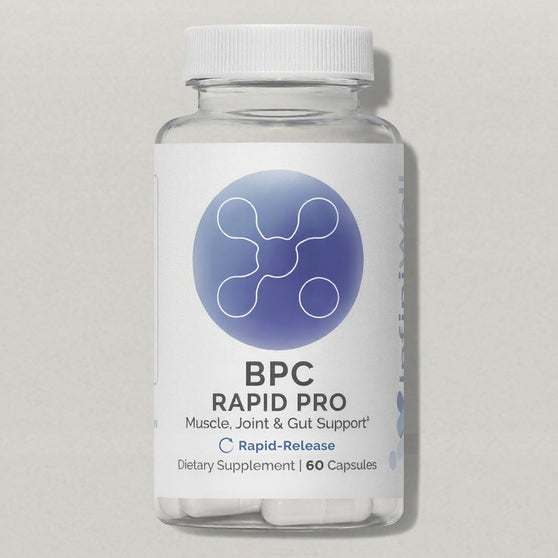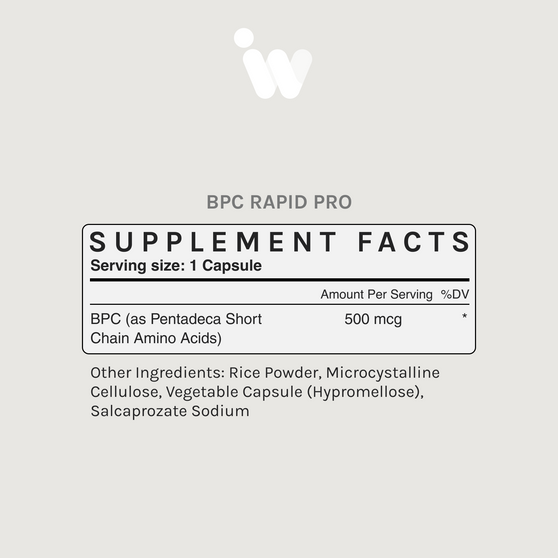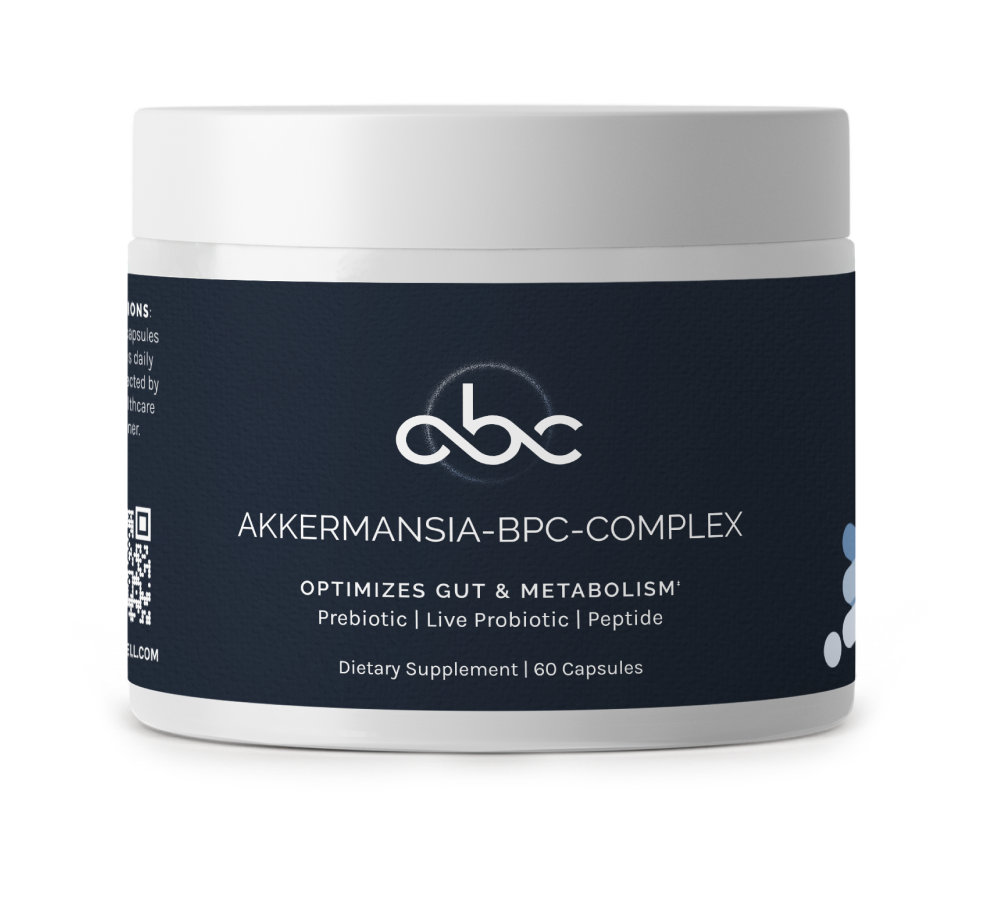Key takeaways
-
Nootropic supplements, including peptides, are often misunderstood—grouped with unregulated “smart drugs” or so-called "study drugs" despite differences in structure, function, and safety profiles.
-
Not all nootropics act like stimulants or ADHD medications, and many are modeled after compounds naturally found in the body.
-
Common concerns about nootropics include side effects, sourcing, and long-term risks, especially when used without expert guidance. These concerns are valid, but they don’t apply equally across all compounds.
-
Peptide-based nootropics are being studied for potential benefits like brain function support, healthy circulation, and effects on working memory and energy metabolism.
-
Nootropics shouldn’t be treated as mental shortcuts but as part of a broader brain health approach that includes sleep, nutrition, and regular exercise.
What once belonged to the pages of sci-fi novels now sits on pharmacy shelves—cognitive enhancers have quietly infiltrated our pursuit of better brain performance.
Marketed as natural stimulants with the power to sharpen focus and strengthen reasoning skills, these compounds, especially the peptide-based kind, claim to support the human brain in ways once reserved for prescription meds. From college students to busy professionals, people are turning to nootropic supplements in search of better thinking skills, sharper memory, and long-term cognitive effects.
But beneath the promise of potential benefits are warnings about nootropic supplements gone wrong, side effects, and unregulated compounds masquerading as “brain boosters.”
So what’s real? What’s risky? And is there actually a safe, science-backed way to support cognitive performance using nootropics?
Let's find out.
What people are saying: Concerns about nootropics
The main concerns around nootropic drugs and peptide-based brain supplements focus on potential health risks, particularly when used without clinical oversight or by otherwise healthy people.
Unknown long-term effects
This is especially true for newer peptides and synthetic compounds that haven't been widely studied in humans. Some active compounds may influence the brain in ways we don’t fully understand yet, raising questions about unintended consequences over time.
Side effects
These may include increased heart rate, jitteriness, changes in blood pressure, or even sleep disturbances. For some users, chasing stronger nootropic effects can cause overstimulation, poor sleep, or mental fatigue.
Use without supervision
From college students cramming for exams to shift workers trying to stay sharp overnight, nootropic drugs and wakefulness-promoting agents are often self-dosed without medical input. This kind of unsupervised use—especially when combined with caffeine or other supplements—can increase the risk of side effects and make it harder to gauge what’s actually working.
Blurred lines between supplements and prescription drugs
Products like modafinil and Adderall—both central nervous system stimulants approved to treat narcolepsy—are being used off-label by healthy individuals seeking sharper focus, mental alertness, or increased productivity.
This crossover between medical and non-medical use raises concerns, especially when these drugs are used without guidance or combined with nootropic supplements.
Muddled sourcing and regulation
Some nootropics sold online come with unclear labeling or questionable quality control. Without standard oversight, it's difficult to confirm the purity, amount, or even the presence of listed active ingredients.
Yes, concerns exist—but here's what’s missing from the conversation
Concerns about nootropics often center on unregulated compounds with little clinical backing, off-label use of prescription drugs, and the unclear status of many dietary supplements. These issues are well-documented and continue to shape public and medical skepticism.
In 2016, the American Medical Association urged physicians to discourage the use of "smart drugs” among healthy individuals, citing questionable benefits and potential health risks—a position that still holds today. But public discussion often stops there, overlooking important distinctions between different types of nootropics.
Grouping every product under the same label—especially newer, peptide-based compounds with more targeted purposes—is misleading. While some nootropics are used casually for short-term focus, others are under active study for their potential role in long-term cognitive support.
Not all nootropics are created equal
Peptide-based nootropics differ significantly from amphetamines, stimulants, or off-label ADHD medications. Instead of delivering a quick jolt like traditional stimulants, they’re often modeled after compounds the body already produces.
Many of these are being researched for their potential to:
-
Support brain function and energy metabolism
-
Aid working memory and processing speed
-
Promote healthy blood flow to the brain
-
Support mental clarity in sleep-deprived individuals and older adults
Naturally occurring nootropics are also common—think rhodiola rosea, Panax ginseng, or fatty acids from fish and meat. Even vitamin C, better known for immune support, has been studied for its potential to protect brain cells from oxidative stress.
What kinds of nootropics are out there?
Nootropics are often grouped in a few different ways, depending on how they’re made, what they do, and how you can access them:
By source
Natural nootropics include herbs, plant extracts, and compounds you’ll find in foods—like ginseng, ginkgo biloba, lion’s mane, or even certain types of mushrooms. Synthetic nootropics are made in labs to target areas like memory or focus. Racetams and noopept are a few names you might have come across.
Meanwhile, pharmaceutical nootropics are prescription drugs—like Adderall or Ritalin—originally developed to treat conditions such as ADHD or narcolepsy.
By access
Some are over-the-counter supplements you can buy without a prescription. Others are prescription-only and meant for a specific medical use. Then there are research chemicals—compounds sold online with unclear legal status, often marked as “not for human use.”
By function
Some are geared toward memory and learning. Others focus on attention and mental stamina. Certain nootropics support mood and motivation, while some are intended to protect long-term brain health.
By mechanism
A few influence acetylcholine, a neurotransmitter linked to learning and memory. Others affect dopamine, which plays a role in motivation and focus. You’ll also find compounds that modulate GABA (for calmness) or glutamate (for alertness and cognition).
Here’s where it gets more complex: many nootropics don’t fall neatly into one category. One compound can affect memory, mood, and focus at once by working in different ways. For example, L-theanine is known to promote calmness without drowsiness and may also support focus when paired with caffeine. That’s why it’s worth understanding how nootropics work together, not just what the label says.
The real takeaway: It’s about context
Nootropic supplements aren’t miracle cures, and they’re not inherently risky, either. When sourced responsibly and used alongside good sleep, nutrition, and regular movement, some nootropics may support cognitive function in healthy individuals. They may also offer added support for people dealing with occasional mental fatigue or age-related changes in focus and memory.
A few things to keep in mind:
-
Choose products with transparent sourcing and clearly listed ingredients
-
Prioritize nootropics with clinical research or published studies
-
Avoid stacking multiple unfamiliar compounds all at once
-
Be cautious of interactions, especially if you’re on blood pressure or mental health medications
Also read:
-
Your Peptide Stack Isn’t Working? More Might Not Be the Answer
-
Peptide Stacks: Optimized Performance or a Biochemical Gamble?
Final word: Brain health decisions deserve nuance
You don’t have to choose between buying into every claim or writing it all off. There’s still a lot we don’t know, but that doesn’t mean nootropics are off-limits. Just be skeptical of anything that sounds too good to be true, and look for real evidence, not just flashy marketing language. If you have a health condition or take medication, talk to your provider before adding any new supplement to your routine.
Mental clarity isn't something you can hack overnight, but for some people, the right nootropic can be one more way to stay steady, sharp, and present when it counts.
Glossary
Terms to know:
-
Alternative medicine: A broad category of health practices and products not typically part of conventional Western medicine. This includes approaches like herbal remedies, acupuncture, and certain supplements. Some alternative treatments are supported by research; others are not.
-
Animal studies: Scientific research conducted on animals to explore how a substance or intervention may affect biological processes. These studies often come before human trials and are used to assess early signs of safety, absorption, or potential benefits.
-
Cognitive enhancers: A broad term used to describe substances—natural, synthetic, or pharmaceutical—that are intended to improve mental performance. Nootropic supplements fall under this umbrella.
-
Mental function: A general term that refers to cognitive abilities such as attention, memory, reasoning, language, and problem-solving.
-
Mentality supplements: Products intended to support cognitive health, focus, or emotional balance. These may include vitamins, herbal extracts, amino acids, or nootropic compounds. Find InfiniWell mentality supplements here.
-
Neurotransmitter: Chemical messengers in the brain that transmit signals between nerve cells. Common neurotransmitters affected by nootropics include dopamine (motivation), acetylcholine (learning and memory), GABA (calmness), and glutamate (alertness).
-
Nootropic stack: A combination of two or more nootropic compounds taken together to target multiple aspects of cognitive function. Stacking can increase potential benefits but also raises the risk of side effects or interactions. Seek guidance from a qualified healthcare provider before combining multiple compounds.
-
Nootropics side effects: Unwanted reactions that may occur after taking cognitive enhancers, whether natural or synthetic. Side effects can range from mild issues like headaches, sleep problems, or digestive discomfort to more serious risks such as high blood pressure, mood changes, or heart-related symptoms—especially when taken in large amounts or combined with other substances. Reactions vary based on the ingredient and the individual.
-
Off-label use: When a medication is used for a purpose not officially approved by regulatory bodies like the FDA. For example, using prescription drugs like Adderall or modafinil for cognitive enhancement in healthy individuals is considered off-label use.
-
Short-term memory: The ability to temporarily store and recall information for a few seconds to a minute. It’s key to everyday tasks like remembering a phone number long enough to dial it. Several natural and synthetic nootropics are explored for their potential to support short-term memory.
-
Systematic review: A type of research study that collects and analyzes data from multiple individual studies on a specific topic. Systematic reviews provide a high level of scientific evidence and are often used to evaluate the overall strength of findings in a particular area of research.
-
SOURCES





















